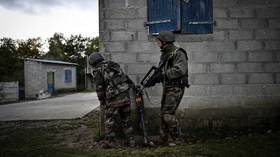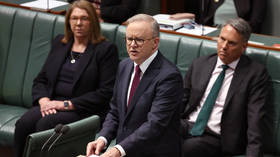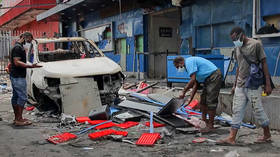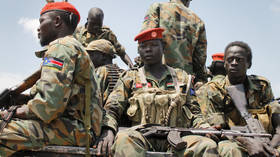Woke elites are erasing Australia’s national identity – no wonder neo-Nazis are on the rise
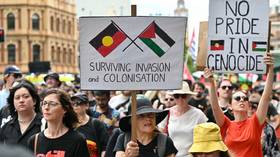
Last week, on January 26th, Australians celebrated Australia Day – the country’s national day, akin to July 4th in America or Bastille Day in France.
Australians are not as overtly patriotic as the Americans or the French, and usually celebrate the public holiday by having a barbeque, going to the beach, or having a few beers with family and friends.
Australia Day this year, however, witnessed displays of political extremism from both ends of the political spectrum – a disturbing trend in a nation that has remained relatively immune from the political instability that has plagued other Western democracies in recent years.
Thousands of people calling for the abolition of Australia Day – recently rebranded as “Invasion Day” by the woke elites that rule Australia – flocked to protest rallies in state capitals throughout the country. And in Sydney, Australia’s largest city, police forcefully prevented dozens of black clad, balaclava wearing neo-Nazis from confronting the protestors.
How has the traditionally apolitical celebration of Australia’s national day come to this?
The short answer is that irrational elite politics in Australia is now generating an even more irrational right-wing extremist backlash that neither side, nor the government, seems capable of controlling.
In recent years, elite politics in Australia has enthusiastically embraced the Aboriginal cause, and radically transformed the nature of Aboriginal politics in the process.
Traditionally Aboriginal politics was focused on repealing racist laws, ending discrimination, obtaining land rights, and remedying Aboriginal disadvantage and poverty – particularly in remote communities.
Over the past fifty years Aboriginal political leaders have achieved substantial reforms – explicitly racist laws have been abolished, formal discrimination ended, and land rights have been recognised in all states and nationally. Sadly, the problem of Aboriginal disadvantage and poverty in remote communities has grown worse.
Unfortunately, in recent years a new generation of Aboriginal political leaders, in conjunction with a few leaders of the previous generation, have been seduced by Australia’s elites and have adopted wholesale their irrational mode of politics.
As a result, the Aboriginal political elite has split into two bitterly opposed groups – one still focused on ending Aboriginal disadvantage and poverty in remote communities; the other irretrievably woke in its orientation.
The latter group is not interested in conditions in remote communities – and focuses its energies on virtue-signalling issues such as unattainable claims of sovereignty, creating the Indigenous Voice to Parliament, rewriting history, destroying statues and, last but not least, calling for the abolition of Australia Day.
The demand to abolish Australia Day derives from the crudely simplistic view – embraced enthusiastically by guilt-ridden white elites and their ignorant millennial and Gen Z children – that Australian history is nothing more than a continuing genocidal war conducted by white colonial oppressors against the Aboriginal people. And if Australian history is nothing more than a protracted exercise in genocide, it follows that Australia’s national day should be abolished.
Those Aboriginal political leaders who have thrown their lot in with the elites now regularly espouse this mantra as a matter of blind faith, as do influential media organisations like ABC and Channel 9.
Those Aboriginal political leaders who are aware of the complex and tragic history of black-white interaction in Australia – and realise that confected elite self-hatred and virtue signalling will do nothing to eliminate Aboriginal disadvantage and poverty – take a contrary view. These leaders also realise that the woke elite takeover of Aboriginal politics is not only extremely damaging and hypocritical, but also insincere.
This was dramatically confirmed recently by the actions of Labor Prime Minister Albanese after the failure late last year of his pet elite project – the 'Indigenous Voice to Parliament' referendum.
Albanese promised to establish the Voice – a constitutionally enshrined Aboriginal advisory body to the federal parliament – the night he won the federal election in May 2022.
Albanese did this at the behest of the group of Aboriginal leaders that had allied with Australia’s elites – as had Albanese and the Labor party years before. The Voice was their idea, and it was opposed by other Aboriginal political leaders.
The Voice was a classic elite project – it was divisive, expensive and would have achieved little. But it would have established dozens of well-paid sinecures for members of the Aboriginal elite who invented it, and, not surprisingly, it was was enthusiastically supported by large corporations, universities, public service organisations, the Labor party, and media organisations.
Albanese’s campaign in favour of the Voice never explained how it would achieve anything worthwhile. Albanese cried crocodile tears while giving endless emotional speeches; pro-Voice Aboriginal leaders told white Australians they were genocidal murderers; and anyone who dared oppose the Voice was immediately branded a “racist”.
Not surprisingly, late last year over 60% of the Australian electorate voted against the Voice.
Albanese responded to this political debacle by saying that he was not responsible for the failure because he was was not Aboriginal, and that anyway Aboriginals were used to disappointments. It is clear that Albanese’s brief and disastrous flirtation with Aboriginal politics has now ended.
Those Aboriginal leaders who campaigned against the Voice were probably not surprised by Albanese’s response – but they are aware that the divisive campaign waged by Albanese and his woke mates has damaged the Aboriginal cause by alienating many white Australians who were sympathetic to legitimate Aboriginal demands.
Those Aboriginal leaders who supported Albanese’s divisive Voice campaign have apparently learnt nothing from its failure, and it is they who are now doubling down in their misguided commitment to white elite politics by supporting protests in favour of the abolition of Australia Day.
How did all of this this play out on Australia Day last week?
Prior to the event, many local Labor councils refused to conduct citizenship ceremonies on Australia Day – as they had traditionally done for decades. Woolworths and Aldi, two of Australia’s biggest supermarket chains, refused to stock national flags or other Australia Day products.
In Melbourne a statue of the eighteenth century explorer Captain Cook – who took possession of Australia for Britain in 1770 and engaged in the first act of reconciliation with Aboriginals – was vandalised and desecrated earlier in the week. And the media conducted extensive campaigns criticising Australia Day and calling for its immediate abolition.
No wonder that thousands of protestors – urged on by elite political leaders both black and white – attended marches demanding the abolition of Australia Day.
Nor should the fact that a group of neo-Nazis sought to confront these protestors in Sydney come as any surprise. For some years such groups have been active in disrupting political demonstrations in Victoria – by far the most woke of all states in Australia.
Media organisations like ABC and Channel 9 have given these groups a disproportionate measure of publicity in recent years. So too have Labor governments by passing repressive so called “hate speech” laws together with laws banning Nazi insignia and the Nazi salute. This week the Labor Premier of New South Wales announced plans to “name and shame” neo-Nazis – thereby ensuring more publicity and advancing their cause even further.
The demonstrators on Australia Day and the neo-Nazis that tried to confront them are different sides of the same irrational political coin.
It should not surprise anyone that calling all white Australians genocidal killers and racists should engender a political movement whose stated aim is to defend white Australia.
As politics grows more irrational in Australia, it appears that political extremism will only intensify in the future.
The statements, views and opinions expressed in this column are solely those of the author and do not necessarily represent those of RT.
